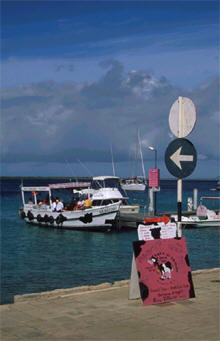 |


|
|
Britain's Best Intentions go Awry |
|
By Susan Raffo
Now, I'm right at the front of the line when it comes to slashing laws that criminalize the bodies of gays, lesbians, bisexual and transgender people. Whether we're talking sodomy, adoption, marriage or immigration, legal infringements on our lives prevent us from accessing full citizenship. But there's something about Britain's behavior that hurts. Democracy is not a pretty system. The majority is not always right and individual freedoms are constantly at battle with communal interests. But at this point in time, I prefer a democratic system, warts and all. Britain's act of legal repeal against the wishes of the majority of the island populations is not an act of democracy. It's an act of imperialism, the forcing of a particular cultural standard against a people's will. I am overjoyed every time another nation rescinds its anti-queer legislation or recognizes domestic partnership for the purposes of immigration and general legal rights. Britain was one of the more recent nations to radically change its internal law, opening the door for gay marriage. I applaud their decisions and take this opportunity to thumb my nose at the United States for refusing to do the same. But even as I am thrilled by every change that allows GLBT people greater freedom around the world, I am saddened by Britain's actions in the Caribbean. I keep trying to find an example that would help illustrate what this action must feel like to people on the five islands. But I can't. There currently is no national or international body that has policing power over the United States. If anything, the U.S. is often the nation that keeps its heels dug in the path of international human rights law, even when the majority of nations on the planet disagree with us. At the international level, we don't have to worry about fighting imperialism because we're usually the nation spreading it around. Imperialism takes place when a national body forces legal policies or cultural practices on another nation without the agreement of the people of that nation. It's a kind of bully-politics. Acts of imperialism don't result in lasting cultural change. Instead, imperialism usually disempowers local populations. After all, imperialism takes the decision out of the hands of the people in a neighborhood and puts it into the hands of a bunch of strangers.
So, when we get off our cruise ships in many of these island ports, rather than using these nations as our sun-drenched playgrounds, let's put some of our vacation money into local queer pockets, and not just the pockets of those we pay to get us drinks or massage our northern skins. Take the idea that tourism fuels local economies and put your tourist dollars into the bank accounts of local people working to make lasting social change in the neighborhoods where they live. Susan Raffo is a writer and activist living in Minneapolis. 
© 1997-2002 BEI |
 Despite Britain's best efforts, Caribbean territories like Anguilla, the Cayman Islands and British Virgin Islands are showing gays to the exits
Despite Britain's best efforts, Caribbean territories like Anguilla, the Cayman Islands and British Virgin Islands are showing gays to the exits